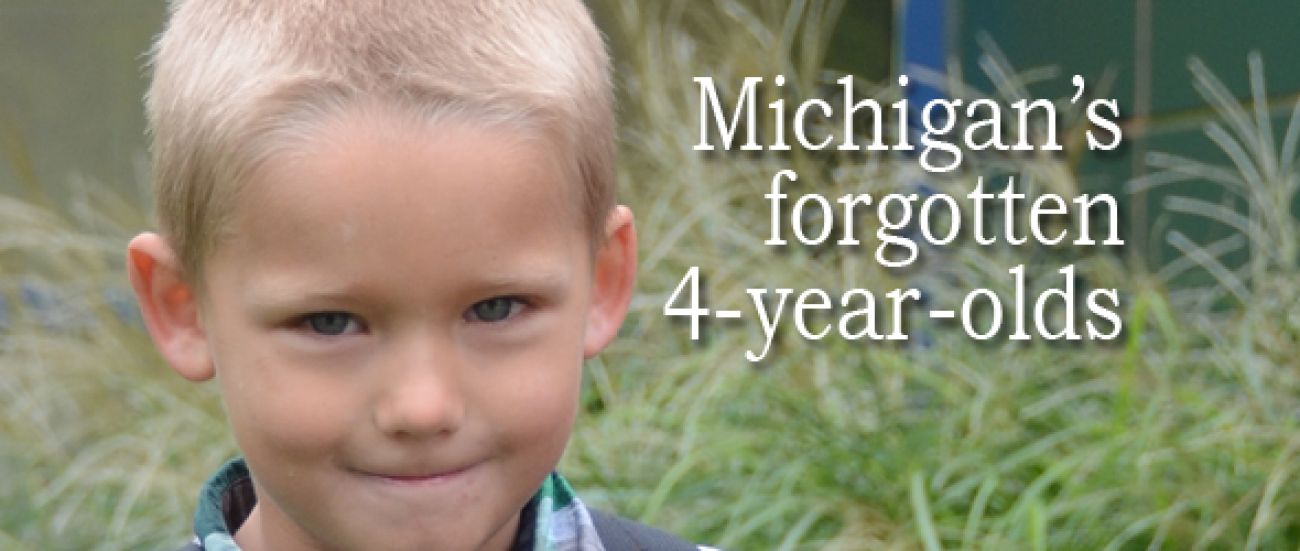Picking winners, losers in preschool


Xavier Eaton is a lucky boy. The Battle Creek child not only got a coveted spot in the state’s free preschool program (Great Start) last year as a 4-year-old, but was in a classroom for a full day, rather than a half-day. Studies indicate he likely is better prepared for kindergarten this fall because he attended full-day preschool.
But to give Xavier that opportunity, Pennfield Schools, in essence, took preschool away from another child.
The state divvies up its preschool money to local school districts based on $3,400 per half-day slot; schools get a set amount of cash for a set number of slots. Once the money’s gone, children go on a waiting list.
For every child like Xavier lucky enough to attend full-day preschool (taking two half-day slots), there’s another child who gets no preschool at all.
That’s the zero-sum game schools play because Michigan has 30,000 more eligible 4-year-olds than public preschool spots.
"Do you service more kids, or fewer kids more intensely?" said Joanne Kelty, who supervises GSRP in Grand Rapids Public Schools. "That’s the question."
Thousands eligible, unserved
 An analysis of state and federal data by Bridge Magazine found that almost 30,000 Michigan 4-year-olds who are eligible for the state’s preschool program are not in class. A recent study shows that, on average, those who don’t attend preschool will do worse in school, drop out at a higher rate, and earn less money in their careers. The impact on the state is just as severe, with higher K-12 costs from higher rates of repeated grades and special education, less skilled workers and lower income tax revenue.
An analysis of state and federal data by Bridge Magazine found that almost 30,000 Michigan 4-year-olds who are eligible for the state’s preschool program are not in class. A recent study shows that, on average, those who don’t attend preschool will do worse in school, drop out at a higher rate, and earn less money in their careers. The impact on the state is just as severe, with higher K-12 costs from higher rates of repeated grades and special education, less skilled workers and lower income tax revenue.
Michigan is one of only a handful of states where public preschool enrollment dropped over the past decade. That’s partly because funding for preschool has been flat for more than a decade. The state dished out $3,300 per half-day preschool slot in 2000; today, it’s $3,400. When inflation is taken into account, that’s a 23 percent cut in funding.
Another reason for the decline is a trend that has benefitted Xavier and thousands of children like him, while shutting other children out – the move toward full-day classes.
Children learn more in a full day of quality preschool than a half day, according to state and national studies. Data analyzed from Kent County by the Kent County Intermediate School District from two demographically similar school districts running a mix of half-day and full-day classes found a 28-percent gap between full-day at-risk students and half-day at-risk students; The gap for English language learners was 38 percent. Across the country, recent studies by the National Institute for Early Education Research and others also found advanced learning results for preschoolers enrolled in full-day programs.
Similar data comparing half-day and full-day kindergarten from Center Line Public Schools backed up the not-so-shocking theorem: more school is better. In the Macomb County community, children in full-day kindergarten classrooms did notably better on letter and word recognition than their half-day peers.
A study in Tulsa, Okla., found that full-day preschool erased the achievement gap between children on free and reduced lunch and children from wealthier families, according to Tim Bartik, senior economist at W.E. Upjohn Institute for Employment Research in Kalamazoo.
About two-thirds of the 23,200 children in GSRP are in half-day programs, with the rest (about 7,700) in all-day classes. Though making up about a third of GSRP preschoolers, those full-time students used up more half of the total state funds.
Mom appreciates full-day option
Xavier’s mother, Rachel Phillips-Eaton, was thrilled with the full-day program at Pennfield’s North Penn Elementary.
"My son learned volumes on socialization and it prepped him for working in a classroom environment," Phillips-Eaton said. "Because of the program, my son has brought his knowledge and comprehension beyond what is needed for the beginning of kindergarten. I feel that he has a vast advantage over children who were not fortunate enough to be a part of this program."
Beyond the academic benefits of the all-day program for children, working parents appreciate the convenience. It’s not uncommon for families to turn down the opportunity for half-day free preschool because their work schedules don’t allow them to take kids to and from school in the middle of the day.
But Michigan’s enrollment can’t grow – in fact, will have to contract – if it continues to move GSRP classrooms to full-day programs without altering the funding system.
In Grand Rapids, for example, the district has converted some half-day classes to full-day. The result is a 25 percent decrease in the number of 4-year-olds in the program.
Erin McGovern, early childhood program coordinator for Kent County Intermediate School District, believes the trade-off is worth it. "Where you’re going to get the biggest bang for your buck is going to full-day," McGovern said. "At least serve the students we have well."
"At-risk kids need the full-day program," said Scott Menzel, superintendent of the Washtenaw Intermediate School District. But pragmatically, given current funding levels, full-day must be reserved for the neediest kids. In what amounts to an academic triage, school districts choose some children for a class that will help them throughout their academic career, and leave others on their own.
One solution would be for the Legislature to allocate additional money earmarked for full-day programs – allowing schools (and children) to choose between half- and full-day, while not decreasing the total number of children served.
Phillips-Eaton is a big supporter of that idea.
"To throw a child into a full day of kindergarten with no preschool experience, it’s overwhelming," she said. "I volunteer a lot in the school, and you can definitely tell the children who’ve been in GSRP and the ones who haven’t."
Senior Writer Ron French joined Bridge in 2011 after having won more than 40 national and state journalism awards since he joined the Detroit News in 1995. French has a long track record of uncovering emerging issues and changing the public policy debate through his work. In 2006, he foretold the coming crisis in the auto industry in a special report detailing how worker health-care costs threatened to bankrupt General Motors.
See what new members are saying about why they donated to Bridge Michigan:
- “In order for this information to be accurate and unbiased it must be underwritten by its readers, not by special interests.” - Larry S.
- “Not many other media sources report on the topics Bridge does.” - Susan B.
- “Your journalism is outstanding and rare these days.” - Mark S.
If you want to ensure the future of nonpartisan, nonprofit Michigan journalism, please become a member today. You, too, will be asked why you donated and maybe we'll feature your quote next time!